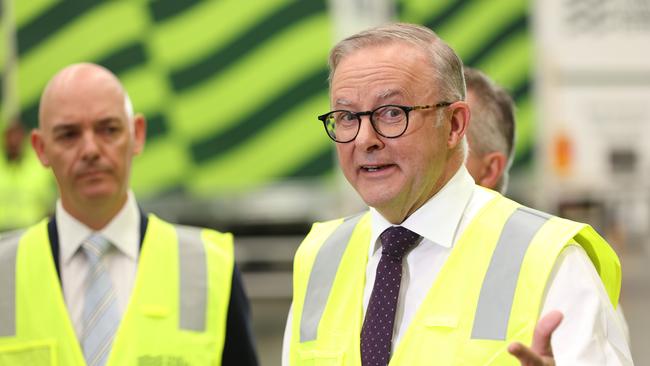Albanese urges Beijing to lift wine restrictions
Anthony Albanese has signalled his expectations for Beijing to lift its restrictions on Australian wine ahead of the visit next week of China’s Foreign Minister Wang Yi.

Anthony Albanese has signalled his expectation that Beijing’s restrictions on Australian wine will be lifted in line with a draft determination issued by the Chinese Ministry of Commerce, as he welcomed the visit to Canberra next week of China’s Foreign Minister, Wang Yi.
The Prime Minister said on Thursday it was a “good thing” that Mr Wang was visiting Australia, with Foreign Minister Penny Wong also expected to press her Chinese counterpart in their Wednesday meeting on the removal of outstanding trade impediments on wine, beef and lobster.
The last time a Chinese Foreign Minister visited Australia was when Mr Wang visited in 2017, with Senator Wong to host him in Canberra for the seventh Australia-China foreign and strategic dialogue.
Mr Albanese said on Thursday that Australian “wine exports to China were worth in excess of $1.1bn per annum.”
“That means that that is a significant benefit for Australia, if that can be lifted, and I’ve said that I’m confident that it will be,” he said. “I look forward to meeting Wang Yi during his visit to Canberra next week.”
Peter Dutton on Thursday said it was “important for us to do whatever we can to build a relationship with big trading nations.”
“I want to make sure that we can increase our exports so that we can grow jobs and grow economic productivity in our country,” the Opposition Leader said.
“We have the most amazing diaspora of Chinese heritage Australians, we celebrate that every day. They contribute enormously to our community, and they’re a wonderful part of our society.”
But Mr Dutton also said that Australia needed to “stand up for what’s in our country’s best interests. We need to make sure that we can keep peace and stability in our region, and we need to make sure that we’re honest with friends.”
The EU’s Indo-Pacific special envoy Richard Tibbels told The Australian on Thursday the region was economically dynamic, but noted there were growing tensions and that the “importance of upholding international law and the international rules based system is clear for all.”
“We want to work with our partners ... to enhance their capabilities and work in new security fields such as foreign disinformation,” he said. “We see this region as extremely important for the future of the world and the future of Europe.”
Mr Tibbels said economic security issues were now directly linked to national security issues and that China “has to be part of the solution rather than part of the problem on climate, debt sustainability, health, resilience…
“So we will continue to seek ways of co-operating with China where possible, but obviously we are, as (EU Commission) President (Ursula) von der Leyen said, in a process of ensuring that we can diversify our supply chains and that means de-risking from China in certain critical areas.”
Senator Wong said that continuing dialogue was “central to a constructive relationship with China and to supporting regional peace and stability.”
“Australia’s approach is consistent; we seek to co-operate with China where we can, disagree where we must and engage in our national interest,” she said.
“It’s Australia’s view that a stable bilateral relationship would enable both countries to pursue respective national interests, if we navigate our differences wisely.”




To join the conversation, please log in. Don't have an account? Register
Join the conversation, you are commenting as Logout